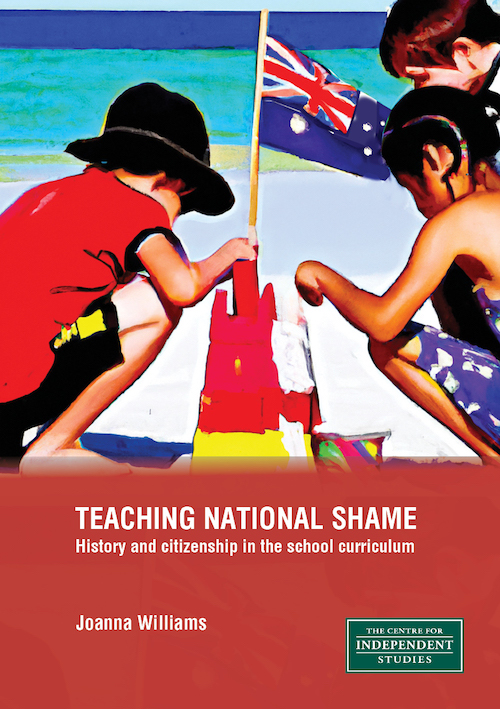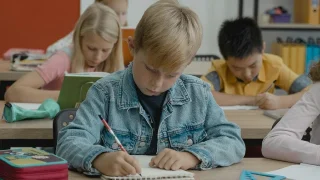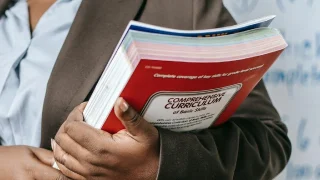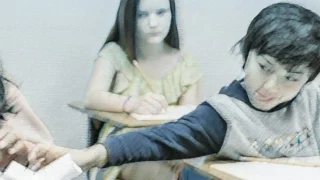

This paper outlines how the teaching of history and citizenship in the school curriculum have contributed to a loss of pride in national identity.
Executive Summary: History and citizenship in the school curriculum
Identification with a nation-state has the capacity to unite disparate individuals in a shared sense of identity and purpose, with education playing a role in the transmission of this identity through a common curriculum.
In this paper, UK analyst Joanna Williams examines the impact of changing approaches to teaching history and citizenship on the cultivation of national identity in Australia and the UK. She notes that the history curriculum has long provided a specific site for the teaching of a national story, while distinct lessons in citizenship are a more recent development.
In both countries, however, rather than celebrating national successes, history classes increasingly focus on sins of the past, thus teaching national shame. Schools have also promoted the values of global rather than national citizenship, with civics lessons encouraging local political activism as a form of democratic engagement. The legacy is cohorts of young people who have grown alienated from their nation-state and its democratic processes.
The paper concludes by calling for greater balance in the teaching of history, whilst pointing out that the very existence of formal citizenship classes speaks to a lack of confidence and consensus in the values associated with national identity. If a new generation is not to be left alienated from its collective past, the nation-building role that schools once played should be revived.
Teaching National Shame: History and citizenship in the school curriculum
Introduction
Although rarely stated explicitly, education can be a key site for the cultivation of national identity.
This has traditionally occurred in three distinct ways. First, the ‘hidden curriculum’ conveys attitudes and values through routine practices such as school assemblies, uniform and rules.[1] Second, subjects such as art, music, literature, and most notably history, transmit national culture and a national story. How we choose to tell this story reflects not objective truths but the dominant attitude towards the nation at a particular point in time. Third, citizenship education — a more recent addition to schooling in Australia and the UK — provides another means of inculcating a sense of national identity in children. Its emergence suggests a growing uncertainty among educational policymakers and senior members of the teaching profession over the role played by the hidden curriculum and more traditional school subjects in promoting national identity.
This paper considers the impact of changing approaches to teaching history and citizenship on the cultivation of national identity in Australia and the UK. In both countries, history classes increasingly focus on past wrongdoings rather than celebrating national successes, and schools promote global citizenship rather than national citizenship. Where the curriculum does not directly challenge national values and identity, it does not prevent potentially activist teachers from inculcating this interpretation of subject knowledge. The upshot is a cohort of young people left alienated from a shared sense of national identity. This can occur irrespective of contrary directives being issued from government ministers. As the British literary theorist Alan Sinfield notes, “It should not be assumed that individuals or groups in positions of (apparent) cultural power simply or necessarily promote the dominant viewpoint.”[2]
A growing reluctance to express national pride is evidenced in numerous surveys. The American educator and author E. D. Hirsch points out that, “Every Fourth of July, the Gallup poll reports a further decline in American patriotism and national pride.” He suggests, “It has become fashionable to question patriotism and contrast it with a nobler globalism.”[3] We return to this point below. The Pew Research Center’s 2021 report into Views About National Identity reveals a growing political divide, with those who identify as being on the right “more than three times as likely to say they are proud most of the time than those on the left.”[4] Such ideological splits increasingly reflect generational voting trends.[5] This suggests politicised teaching has had some degree of success in cultivating ambivalence — if not antipathy — towards national identity.
Re-writing the past
The messages adults convey about the past, delivered informally through the general culture and more formally through schooling, teach children about the society they have been born into. For this reason, as Hirsch explains, “Schooling in a democracy is not just schooling. It’s also citizen making.”[6]
Memorialising influential figures in public monuments suggests the past can be seen as a source of pride or inspiration. The recent outbreak of iconoclasm, on the other hand, suggests the past is a source of shame and there are few heroes worthy of respect. The moral complexity of history is apparent in every national story and it is for people in the present to determine which past events and interpretations of history to emphasise. Ignoring past atrocities leaves young people ignorant and at risk of repeating immoral acts. But an increasingly prioritised focus on atrocities above all else robs a national story of its capacity to inspire and unite.
Today’s iconoclasts express their disgust not just with national heroes but, far more fundamentally, with a nation’s sense of itself in the present. Their actions reflect alienation from national identity as much as they contribute towards inculcating shame in future generations. Although attacks on statues may be newly fashionable, alienation from national history and traditional values is not a recent phenomenon. As Frank Furedi notes in 100 Years of Identity Crisis, as far back as a century ago teachers felt uneasy about “educating young people to embrace the values of the pre-First World War era” and were increasingly driven by a sense that young people “had to be distanced from the traditions and values of the past.”[7] It was this sentiment that first led to a breakdown in the consensus about the national stories teachers should transmit.
When history serves to divide and chastise, we lack the shared cultural reference points that enable a national story to transcend divisions of race, gender and sexuality. According to Furedi, far from assuming responsibility for the world, adults leave children “confused about the values with which they should identify.”[8] Our education system compounds such confusion. As Hirsch notes, this occurs when, in the absence of consensus, “one school adds certain lessons for the sake of diversifying the curriculum and other schools add different lessons of their own, [so that] we’re left with divided citizens who cannot communicate with one another, because they don’t have enough knowledge in common.”[9]
Elites against the nation
Some academics and commentators have welcomed the fact that the nation-state no longer plays the significant role it once did in shaping both world events and people’s sense of identity. “We are living in a global age,” declared sociologist Gerard Delanty in 2000, where “citizens are exposed to a far greater range of influences, resources and dangers than was formerly the case.”[10] But such sentiments are not new. Delanty articulates a longstanding elite antipathy to the nation-state.
The experience of World War I led the British cultural elite to question the meaning and significance of national identity, particularly as it was encapsulated in the relationship between a nation’s citizens and its past. As Furedi notes “The Great War fundamentally undermined the cultural continuity of the West. For many Europeans it appeared that their relationship with their past had become fatally undermined.”[11] A similar sense of World War I acting as an irreparable break can be identified in Australian history too, but in a very different way. Australia’s huge losses led to a perceived need to free Australian identity from the bonds of empire.[12] In both the UK and Australia, the interwar period came to be marked by a belief that “a break with the past was both possible and necessary.”[13] Yet traditional loyalties were soon to be tested again.
In Britain, during World War II, Winston Churchill’s speeches often focused on national unity. In December 1942, he declared: “All are united like one great family; all are standing together, helping each other, taking their share and doing their work.” Later commentators have emphasised that Churchill sought to create this unity, and was not simply reflecting it. Sinfield notes that, “Already, before the blitz, popular commitment to the British state was uneven — susceptible to stimulation by events like George V’s jubilee, but generally acquiescent rather than enthusiastic.”[14] His phrase “susceptible to stimulation” reveals a condescension to the populace, many of whom did feel their country was worth fighting for. It was, as George Orwell notes, sections of the elite who needed persuading. Writing in 1941, Orwell explained, “England is perhaps the only great country whose intellectuals are ashamed of their own nationality.”[15] He continued: “It is a strange fact, but it is unquestionably true that almost any English intellectual would feel more ashamed of standing to attention during ‘God Save the King’ than of stealing from a poor box.” Perhaps all that has changed since this time is that the English are not alone: intellectuals in other countries have become just as adept at national self-loathing.[16]
In the aftermath of World War II, European intellectuals placed the blame for global conflict on nationalism. Britain’s colonial territories were granted independence while, at home, an emerging ‘post-war consensus’ was characterised by ‘welfare-capitalism’ and a considerably enlarged state. Sinfield describes this period as “an unprecedentedly ambitious project of state legitimation.”[17] But the state’s legitimacy was built on its administration of a period of unprecedented economic growth. Political support for welfare-capitalism did not translate into elite patriotism. Indeed, it was during this period that Orwell’s intellectuals went from counter-cultural to establishment figures. Their disdain for national identity was led by the view that “nationalism thinly disguised by democracy can be a destructive force.”[18]
As the post-war consensus began to unravel, economic globalisation led to the necessary connection between state and nation being called into question. As Delanty notes: “The state is no longer entirely in command of all the forces that shape it and sovereignty has been eroded both downwards to subnational units, such as cities and regions, and upwards to transnational agencies, such as the European Union.”[19] With state and nation detached, the meaning and significance of citizenship becomes more fluid. In more recent years, the relationship between state and nation has become so contested that even the right of countries to maintain national borders has been called into question by some on the political left.[20] Citizens who defend the notion of borders, or express pride in their country, are castigated as ignorant and old fashioned at best, or racist and xenophobic at worst.[21]
In opposition to national citizenship, Delanty calls for “cosmopolitan citizenship”, which he describes as “multi-levelled, cutting across the subnational, the national and the transnational.”[22] This stands in stark contrast to more traditional, and less flexible, notions of citizenship that were dependent upon membership of a nation either by birth or explicit affiliation. As Furedi notes, “the distinction between citizen and non-citizen is frequently condemned as unjust and exclusionary.”[23]
With the connection between citizen and nation undermined, what remains is a cultural legacy that often takes the form of an emotional attachment. This troubles a cultural elite who have struggled to make sense of the success of populist movements and events such as Brexit. Over the past century, education has repeatedly been recruited to break the emotional bond between citizenship and nationality in children through socialising them into a set of moral values that are distinct from those of their parents or members of their community. This speaks to a conscious drive to steer children away from more organic associations with national identity and the imperative to engineer new loyalties.
One recent example of this is the EU’s proposal to introduce a compulsory common citizenship curriculum into schools in all member states. Schools will be expected to provide lessons in “European integration” in order to challenge what is perceived to be a growing euroscepticism. This is motivated by the assumption that “insufficient knowledge of or ignorance about the EU and poor understanding of its functioning” lies behind the EU’s unpopularity with citizens. To challenge this, there are plans to set standards for a “minimum understanding” of what it means to be a citizen of the EU, as well as the formation of a “European common identity”.[24] It is difficult to see this as anything other than a crude attempt to exploit education for expressly political purposes.
In what may, at first glance, appear to be a contradictory move, the problematising of national identity through education runs in parallel with calls for schools to run formal classes in civics and citizenship. Citizenship has been part of the National Curriculum in England and Wales since 1991, while the Australian government’s national civics and citizenship programme, Discovering Democracy, ran for 10 years from 1997, with Civics and Citizenship classes having continued — and indeed been formalised and reinvigorated — since this time. As we will explore below, the demand for citizenship classes often speaks to a lack of confidence and consensus in the values associated with national identity.
From pride to shame in the history classroom
Political, educational and cultural elites have long recognised that the history curriculum represents far more than a set of topics for children to master. Uniquely, history provides a powerful mechanism for conveying a national story. Today, teachers and policymakers alike recognise there is not an undisputed account of the past. Hence, the selection of curriculum content reveals as much about our values and priorities in the present as it does about past events.
Recent decades have witnessed a growing emphasis on skills, rather than knowledge, in history teaching. This is premised on an understanding that the past is ‘messy’ and people need to be ‘trained’ to make sense of it. Yet even this reveals contemporary values: it reinforces the potentially relativist notion that there is no agreed narrative but multiple, equally valid, interpretations. The focus on skills can also be disingenuous. An aim of the recently revised Modern History curriculum (Version 8.4) in Australia was the “application of historical concepts, including evidence, continuity and change, cause and effect, significance, empathy, perspectives and contestability.”[25] Here, we see that skills and attitudes have become blurred. An ability to evaluate evidence requires a thorough grounding in subject knowledge but “empathy” speaks to an emotional state, not dispassionate analysis. This focus on emotional responses empowers potentially activist teachers to promote their own interpretations irrespective of the knowledge content of the curriculum.
Some Australian historians are keen to bring emotion into history. Anna Clark, author of Making Australian History, notes that “History can play a vital role in truth-telling and reconciliation … Seeking justice, remembering and addressing this nation’s past is an ongoing and necessary condition of individual and collective healing.”[26] Truth, justice and healing are presented as necessarily contingent. But the suggestion that the study of history has a purpose — “healing” — stands in opposition to a search for “truth”. Ultimately, “justice” is not an academic pursuit but a political goal. For education to be meaningful, pupils need to move beyond emotion and the demonstration of pre-determined, politically-driven conclusions.
Lessons from diversifying the UK curriculum
Debates about the content of the history curriculum began long before England’s National Curriculum was first developed. Academic Christine Counsell points to the Schools Council History Project (SCHP) which, in 1972, “launched a radically new content offer” which “included topics strongly linked to present-day crises.” This led to a focus on topics such as Northern Ireland and the Arab-Israeli conflict, as well as “world themes across time such as energy and medicine, and an emphasis on local history through the archaeology of the built and natural environment.”[27] Counsell notes that, even at this point in the 1970s, the SCHP was partly reacting to shifts in the academy that prioritised “black history, women’s history and attention to indigenous peoples that sought to transcend and critique colonial lenses.”[28] The presumed need for ‘representative history’ has since driven curriculum development for half a century.[29] This identitarian approach can lead to topics being taught in isolation and children having little sense of chronology. It also leaves history open to movements inspired by critical race theory to decolonise the curriculum.[30]
In 2010, the UK’s Conservative government attempted to overhaul a history curriculum that had come to be seen as not just political but anti-British. Then Education Secretary Michael Gove pledged that “all pupils will learn our island story” and went so far as to argue that “this trashing of our past has to stop.” His announcement was criticised by teachers, academics, teaching unions, historians and the presidents of learned societies such as the Historical Association.[31] For the most part, history teachers continued to pursue diversity as a core curricular goal.
In 2021, research by the Universities of Oxford and Reading found 87 per cent of UK secondary schools had made substantial changes to history teaching to address issues of diversity.[32] According to this study, the reasons cited included “a sense of social justice, to better represent the nature of history and the stimulus of recent events.” Seventy-two per cent of teachers claimed their classes covered the history of migration while 80 per cent said they engaged pupils in a study of Black and Asian British history. Most common was a focus on the post-war period, including the experiences of the ‘Windrush generation’, the first cohort of immigrants from the Caribbean to arrive in the UK, named after the ship in which they travelled. However, many teachers also reported teaching other topics such as the ‘black Tudors’ — Africans who lived and worked in England during the Tudor and Stuart eras.
Despite this evidence of diversity, the narrative of a Eurocentric curriculum that alienates black pupils dominates public discourse. In March 2021, the UK government’s Commission on Race and Ethnic Disparities (CRED) published a wide-ranging report into racial inequality and bias in British society. Its findings proved controversial, in particular the statistical evidence presented to suggest that once socio-economic status is controlled for, “all major ethnic groups perform better than White British pupils except for Black Caribbean pupils (with the Pakistani ethnic group at about the same level).”[33]
Most controversially of all, in relation to the curriculum, the CRED report notes that “British history is not solely one of imperial imposition — Commonwealth history and literature reveals a more complex picture, in which ideas travelled in multiple directions”; and that pupils should be taught slavery was not just about “profit and suffering” but “how culturally African people transformed themselves into a re-modelled African/Britain.”[34] The final part of this sentence has frequently been omitted by the report’s critics.
The UK government’s response to the CRED report, Inclusive Britain, proposes “a new knowledge-rich model history curriculum by 2024 to support high-quality teaching of our complex past.”[35] According to Schools Minister Robin Walker, the new curriculum will emphasise “diversity, migration and cultural change”. Longstanding topics like the Tudors and the Second World War will still be taught but will be presented in the context of Britain’s place in the world.[36] Walker has said that putting British history in context is key to challenging activists wanting to pull down statues of historical figures: “If there was more understanding you’re less likely to have people wanting to pull down statues and more people wanting to explain the background around them.” Whether such sentiments have the capacity to thwart activist teachers is yet to be seen.
In both the UK and Australia, a balanced interpretation of the past requires more than a partial reading of history that emphasises only the sins of a nation’s past. Children deserve access to the powerful knowledge that comes with a sense of national chronology and a balanced understanding of both the positive and negative aspects of a nation’s story. Although such knowledge may be a feature of national curricula, there is little to prevent some teachers promoting values that challenge positive interpretations of national identity.
From national to global citizenship
Elite questioning of the role of schools in promoting common values and a unified sense of national identity through subjects such as history, has gone hand in hand with calls for the formal teaching of citizenship. This reveals the perceived role of schools in redirecting children away from loyalty to family, community and nation and towards more expressly political projects of social justice, sustainability and loyalty to transnational institutions. Citizenship classes often promote community activism as a form of democratic engagement and the values of global, rather than national, citizenship.
The evolution of citizenship education in Australia
Civics and citizenship education (CCE) has existed within Australia’s education systems for more than a century — although this was traditionally organised at state level, which allowed for significant variation in content across the nation as a whole. Philosophically, CCE was conceived of as a way to help build a sense of unity and being ‘Australian’ in the early years of the new nation.[37] As Fiona Mueller notes, the 1901 agreement “to unite in one indissoluble Federal Commonwealth” stemmed from a belief “that informed political participation is central to an accountable democracy, and that it is a unique mechanism for developing an individual’s sense of self-worth and commitment to a better society.”[38] Although practice varied, teaching civics and citizenship was intrinsic to this national project. Several decades later, such ideas no longer held sway with educationalists. A 1994 report, Whereas the People … Civics and Citizenship Education in Australia, confirmed a chronic deficit of civic knowledge and concern about the levels of commitment to Australian political institutions.[39] This fed into discussions about the need for a national curriculum.
Discovering Democracy, published in 1997, was the federal government’s response to Whereas the People. It aimed to encourage “the development of skills, values and attitudes that enable effective, informed and reflective participation in political processes and civic life.”[40] However, as Education Professor Murray Print notes, “despite clear policy advocacy and the injection of considerable federal funding together with the apparent cooperation of the states and territories, the Discovering Democracy programme, or even some form of a CCE programme, was not mandated … and consequently schools implemented the programme at will.”[41] CCE came to be characterised “as mercurial, its fortunes ebbed and flowed in response to political ideology, federal election outcomes and bureaucratic whim.” At best, Discovering Democracy resources were integrated into existing subjects for pupils in some school years.
Since the mid-1990s, Australian educators have been increasingly focused upon promoting global (as opposed to national) citizenship. They are following the Melbourne Declaration on Educational Goals for Young Australians (2008) and ACARA (Australian Curriculum, Assessment and Reporting Authority) 2012, both of which promote the advancement of global citizenship as an aim of schooling.[42] In addition, the OECD PISA (Programme for International Student Assessment) initiative has long promoted global citizenship and, in 2018, measured “students’ capacity to examine local, global and intercultural issues, to engage in open, appropriate and effective interactions with people from different cultures, and to act for collective well-being and sustainable development.”[43]
Educators saw the apparent economic triumph of globalisation as further justification for promoting notions of global citizenship in the classroom. As Professor of Education Lucas Walsh notes, “With globalisation, new locations of citizenship have emerged beyond the borders of the national state.”[44] This chimed with a drive to promote issues of social justice, environmental sustainability and multiculturalism that were also considered to transcend national borders. Social justice in particular was pitched against “the kind of individualist approach to citizenship articulated by liberalism.”[45]
The cultivation of global citizenship is an inherently moral and (although rarely stated explicitly) political project. As Rosalyn Black, Lecturer in Education at the University of South Australia, notes, “cosmopolitan citizenship education with a utopian vision has the potential to challenge existing structures whether of the school or of wider society.”[46] Although children are encouraged to think of themselves as interconnected to others on the world stage, they are encouraged to see citizenship as a practice to be enacted at a local level, involving themselves in community activities and protests, such as climate strikes.[47] Black suggests young people “are increasingly expected not merely to ‘be’ citizens but to enact their citizenship in practical ways.”[48] This combination of morality and activity lends itself to a set of distinct values. One advocate argues schools should “help young people to understand global issues including climate change, resource depletion and the world financial system.” Recent iterations of the Australian civics curriculum have emphasised community-based learning experiences rather than the knowledge-rich, nation-building notion of citizenship set out in 1901. This shift further allows teachers to bring their own views and values into the classroom.
Linking citizenship to diversity in the UK
Historically, British children have not had formal citizenship lessons. In part, this can be explained by the ‘taken for granted’ status of the nation, in contrast to Australia where there was a perceived need to cultivate national identity with the political creation of the nation-state. The need for formal citizenship classes was raised in the UK when New Labour took office in 1997. Under Tony Blair, government ministers were concerned with the problem of social exclusion and, in particular, young people who were classed as NEET (Not in Education, Employment or Training). Attention was focused on the ‘democratic deficit’ or, in other words, young people who did not vote or otherwise engage with public institutions. Citizenship classes were viewed as a means of promoting civic responsibility and an antidote to the individualism of the previous Conservative government.
An Advisory Group on Citizenship and Democracy in Schools was established, chaired by Professor Bernard Crick. The group’s final report, known as the Crick Report, was published in 1998. The ambitious aim was “no less than a change in the political culture of this country both nationally and locally.”[50] The report argued that all children needed citizenship lessons to tackle “political disconnection”. Since this time, the development of citizenship classes in the UK has, in many ways, paralleled discussions about the national curriculum in Australia.
In August 2002, the UK Labour government made citizenship a compulsory subject for every student in English schools but, as in Australia, it was possible for schools to teach citizenship through the existing curriculum; in other words, through incorporating new topics into existing subjects. This meant that there were large variations in practice depending on the enthusiasm and priorities of individual schools and teachers. The need for more comprehensive provision was addressed in a 2007 Curriculum Review led by Sir Keith Ajegbo. His final report focused on diversity and citizenship and found that, “Despite much good practice in trailblazing schools, the quality and quantity of education for diversity are uneven across England.”[51]
The renewed emphasis on citizenship classes and the linking of citizenship to diversity was, in part, driven by the London bombings of July 2005 and the realisation that they were carried out by British citizens. There was also political concern about the integration of migrant workers from Eastern Europe into the EU. The report set out a ‘vision’ that all schools should be “actively engaged in nurturing in pupils the skills to participate in an active and inclusive democracy, appreciating and understanding difference.”[52] Seemingly with no awareness of the inherent contradictions between “difference” and “inclusion” the report spoke of a need to “provide young people with a common sense of identity and belonging”.
The connection between citizenship education, civil renewal and community cohesion became formalised in the new National Curriculum introduced into schools in 2008. Distinct citizenship classes aimed to enable all young people to become “responsible citizens who make a positive contribution to society”. In addition, a new theme, “Identities and Diversity: living together in the UK” involved “appreciating that identities are complex”, “considering the connections between the UK, Europe and the rest of the world” and “exploring the diverse national, regional, ethnic and religious cultures, groups and communities in the UK and the connections between them.”[53]
In the decade between 1997–2007, citizenship classes rapidly became a catch-all solution to a wide range of social and political problems that had little to do with education. This has continued. Post-Brexit, a number of head teachers and representatives of professional associations signed an open letter to then Education Secretary Justine Greening calling for a renewed commitment to the teaching of PSHE (Personal, Social and Health Education), Citizenship and Religion.[54]
The authors of the 2021 CRED report argued that, “In order to develop a sense of citizenship and to support integration and aspiration amongst all ethnic communities, we believe that pupils need to be exposed to the rich variety of British culture and the influences that have shaped it, ranging from the influence of classical civilisations, the European Enlightenment, the inflows and outflows of the British Empire, and the stream of new arrivals in the post-war period to the present day.”[55] This positive vision places the school’s role in promoting citizenship with the teaching of a range of academic subjects and not with explicit instruction in citizenship. The report’s distinctive emphasis on British culture takes us away from a celebration of global citizenship, which had been promoted by teachers and professional bodies as a response to Britain’s decision to leave the EU.
The problems with teaching citizenship
There are a number of problems with the promotion of global citizenship. As an essentially abstract concept, global citizenship cannot hope to unite a population in the same way as the more concrete reality of belonging to a nation-state. Although citizenship classes are promoted as a means of tackling a democratic deficit, global citizenship undermines the nation-state — the foundational democratic unit — by making it seem less significant than transnational institutions on the one hand, or local action on the other. Global citizenship is a hollow concept in comparison to the specific democratic rights and responsibilities associated with national citizenship. Chantal Delsol describes the project of promoting world citizenship as “a question of dis-incarnating humanity, of detaching man from his territorial and temporal roots, of making him abstract, of saturating him with indetermination.”[56]
The focus on activity within local communities makes citizenship classes distinct from other school subjects. It is anti-intellectual and serves to deny children access to the powerful knowledge that could transform their lives. Active local citizenship is described as a “palliative” or “prophylactic measure” in Australia and as “an antidote” in the UK. This medicalised language suggests that classes can ward off future disease — but the ‘illness’ is social and political, not educational. What’s more, some young people “reject the notion of becoming engaged in their low socio-economic community” on the grounds that it “would only increase their own experience of being poor.”[57]
Citizenship classes encompass a specifically political agenda, yet this is hidden behind a rhetoric of ‘values’ that are to be demonstrated rather than questioned. In this way, children come to take on board a particular moral outlook without any capacity to disagree. One example of this is the promotion of sustainability. Sustainability speaks to one approach to addressing environmental concerns that is often anti-growth and anti-development. Rather than asking children to debate the benefits of fair trade versus free trade, or nuclear power versus renewables, they are expected to show how they have made lifestyle changes to demonstrate sustainability. Through such processes, globalist elite opinion becomes recast as universal moral values. Ultimately, as Furedi argues, “Whatever one thinks of national borders, there can be no democratic public life outside their confines. It is only as citizens interacting with one another, within a clearly geographically-bounded entity, that democratic decision-making can work.”[58]
Citizenship classes were established to promote democratic engagement but, in presenting political decisions as moral imperatives, they leave people further distanced from debate. Indeed, the very notion that alienation from politics can be addressed through the education system, rather than through the political realm, is questionable. A values-laden curriculum materialised through behaviour modification undermines free intellectual inquiry and limits students’ freedom of conscience.
Conclusions
Identification with a nation-state has the capacity to unite disparate individuals in one positive identity and a shared sense of purpose. Education is able to play a key role in the transmission of national identity through a common curriculum that inducts children into the music, art, literature and traditions of their nation. History tells children a national story. Just as pupils should be encouraged to critique art and literature, so too can students be expected to appreciate the complex legacy of a nation’s past in terms of both positive and negative consequences of events. But it is this balance that is important.
In both Australia and the UK, successive generations of children have been taught a disparate, topic-based curriculum that substitutes identity for chronology and elite national shame for balance. The legacy is cohorts of young adults who have grown alienated from their nation and its democratic processes.
Citizenship classes speak to a crude recognition of this social problem. However, in focusing pupils’ attention away from the nation and on to the global stage, away from intellectual engagement and on to activity, they are not only a poor substitute for the role schools once played in building national identity but — worse — they exacerbate the very problems they seek to solve. A new generation is left alienated from its collective past and distanced from the potential to bring about positive change. As Hirsch argues, “The nation-sustaining enterprise of our schoolteachers must be revived.”[59]
Joanna Williams is the founder and director of CIEO, an independent think tank in the United Kingdom. She is a weekly columnist for the online magazine Spiked and writes regularly for numerous other publications including The Times, The Spectator, The Telegraph and The Daily Mail.
Joanna taught at the University of Kent for more than 10 years and was the director of Kent’s Centre for the Study of Higher Education. Most recently, she worked as Head of Education and Culture at Policy Exchange. Her latest book, How Woke Won was published by Spiked in May 2022. She is also the author of Women vs Feminism (2017), Academic Freedom in an Age of Conformity (2016) and Consuming Higher Education: Why Learning Can’t be Bought (2011).
Endnotes
[1]Assor, A. and Gordon, D. (1987), “The Implicit Learning Theory of Hidden-Curriculum Research”, Journal of Curriculum Studies, 19:4, pp. 329 – 339.
[2] Sinfield, A. (1997), Literature, Politics and Culture in Postwar Britain, The Athlone Press, p. 35.
[3] Hirsch, E. D. (2020), How To Educate A Citizen: The Power of Shared Knowledge to Unify a Nation, John Catt, p. 10.
[4] Pew Research Center (2021), “Views About National Identity Becoming More Inclusive in U.S., Western Europe”, https://www.pewresearch.org/global/2021/05/05/views-about-national-identity-becoming-more-inclusive-in-us-western-europe/
[5] It was estimated that over 50 per cent of voters aged 18 – 34 backed the Labour Party in the UK’s 2019 general election compared to just over 20 per cent of those aged 65 plus. In Australia, the generational/political split is even more stark. The 2019 Australian Election Study estimated that 81 per cent of those aged 18 – 24 voted for either the Labor or Green Party, in comparison to just 31 per cent of those aged over 65. See https://australianelectionstudy.org/
[6] Hirsch, How To Educate A Citizen, p. 12.
[7] Furedi, F. (2021), 100 Years of Identity Crisis, De Gruyter, p. 1.
[8] As above, p. 81.
[9] Hirsch, How To Educate A Citizen, p. 11.
[10] Delanty, G. (2000), Citizenship in a Global Age, Open University Press, p. 1.
[11] Furedi, 100 Years of Identity Crisis, p. 94.
[12] Beaumont, J. (2018), “The Damage Inflicted on the Australian Home Front by the Great War”, The Strategist, Australian Strategic Policy Institute, https://www.aspistrategist.org.au/the-damage-inflicted-on-the-australian-home-front-by-the-great-war/
[13] Furedi, 100 Years of Identity Crisis, p. 94.
[14] Sinfield, Literature, Politics and Culture in Postwar Britain, p. 10.
[15] Orwell, G. (1942), “The Lion and the Unicorn: Socialism and the English Genius” in Essays, Penguin Modern Classics, p. 155.
[16] As an example of the form this discussion takes in Australia, see Simon Cowan on the #changethedate campaign against traditional Australia Day celebrations: https://www.cis.org.au/commentary/opinion/australians-shouldnt-be-ashamed/
[17] Sinfield, Literature, Politics and Culture in Postwar Britain, p. 16.
[18] Delanty, Citizenship in a Global Age, p. 6.
[19] As above, p. 19
[20] See for example, Sager, A. (2020), Against Borders: Why the World Needs Free Movement of People, Rowman & Littlefield International.
[21] See for example, Penny, L. (2016), “I Want My Country Back”, New Statesman, 24 June, https://www.newstatesman.com/politics/2016/06/i-want-my-country-back
[22] Delanty, Citizenship in a Global Age, p. 5.
[23] Furedi, F. (2021), Why Borders Matter, Routledge, p. 40.
[24] Barnes, J. (2022), “EU Accused of ‘Indoctrinating Children’ After MEPs Back Europe-wide Compulsory Curriculum”, The Telegraph, 16 April.
[25] https://www.australiancurriculum.edu.au/senior-secondary-curriculum/humanities-and-social-sciences/modern-history/
[26] Cited in Cairns, R. (2022), “The National History Curriculum Should Not be Used and Abused as an Election Issue”, The Conversation, 17 February, https://theconversation.com/the-national-history-curriculum-should-not-be-used-and-abused-as-an-election-issue-176783
[27] Counsell C. (2021), “History”, in Alka Sehgal Cuthbert and Alex Standish (eds), What Should Schools Teach?: Disciplines, Subjects and the Pursuit of Truth (Knowledge and the Curriculum), UCL Press, p. 219.
[28] As above, p. 220.
[29] Defined by one teacher as “widening the range of stories we tell in our curriculums to include those which have traditionally been neglected, such as the histories of women, ethnic minorities, the LGBTQ+ community, and the working class.”
[30] For a more detailed discussion of this point, see Kurti, P. (2022), Raging Against the Past: Guilt, Justice, and the Postcolonial Reformation, Analysis Paper 35, Centre for Independent Studies, April, https://www.cis.org.au/publication/raging-against-the-past-guilt-justice-and-the-postcolonial-reformation/
[31] Boffey, D. (2013), “Historians Attack Michael Gove over ‘Narrow’ Curriculum”, The Guardian, 16 February, https://www.theguardian.com/politics/2013/feb/16/historians-michael-gove-curriculum
[32] University of Oxford (2021), “History Teaching has Substantially Changed to Address Diversity, Say Teachers”, 22 October, https://www.ox.ac.uk/news/2021-10-22-history-teaching-has-substantially-changed-address-diversity-say-teachers
[33] Commission on Race and Ethnic Disparities (2021), The Report, https://assets.publishing.service.gov.uk/government/uploads/system/uploads/attachment_data/file/974507/20210331_-_CRED_Report_-_FINAL_-_Web_Accessible.pdf
[34] As above.
[35] Gov.UK (2022), Policy Paper: Inclusive Britain: Government Response to the Commission on Race and Ethnic Disparities, 17 March, https://www.gov.uk/government/publications/inclusive-britain-action-plan-government-response-to-the-commission-on-race-and-ethnic-disparities/inclusive-britain-government-response-to-the-commission-on-race-and-ethnic-disparities
[36] Cole, W. (2022), “Schools Told to Overhaul History Curriculum to Tackle ‘Diversity, Migration and Cultural Change’ Instead of Repeating the Tudors and Second World War”, Daily Mail, 26 February, https://www.dailymail.co.uk/news/article-10554393/Schools-told-overhaul-history-curriculum-tackle-diversity-migration.html
[37] Print, M. (2017), “The Recent History of Teaching Civics and Citizenship Education in Australia 1989-2015”, in Peterson, A. and Tudball, L. (eds), Civics and Citizenship Education in Australia, Bloomsbury, p. 7.
[38] Mueller, F. (2021), A 2021 Education Resolution: Keep an Eye on the Australian Curriculum, Occasional Paper 179, Centre for Independent Studies, p. 1, https://www.cis.org.au/publication/a-2021-education-resolution-keep-an-eye-on-the-australian-curriculum/#_edn1
[39] Print, “The Recent History of Teaching Civics and Citizenship Education in Australia, p. 9.
[40] Civics and Citizenship Education, Discovering Democracy Units, https://www1.curriculum.edu.au/ddunits/about/about.htm
[41] Print, as above, p. 11.
[42] Walsh, L. (2017), “The Needs and Challenges for Global Citizenship Education”, in Peterson, A. and Tudball, L. (eds), Civics and Citizenship Education in Australia, Bloomsbury, p. 101.
[43] OECD, “PISA 2018 Global Competence”, https://www.oecd.org/pisa/innovation/global-competence/
[44] Walsh, “The Needs and Challenges for Global Citizenship Education”, p. 105.
[45] As above.
[46] Black, R. (2017), “Active Citizenship and the ‘Making’ of Active Citizens in Australian Schools”, in Peterson, A. and Tudball, L. (eds), Civics and Citizenship Education in Australia, Bloomsbury, p. XX.
[47] See for example: https://www.schoolstrike4climate.com/
[48] Black, R. (2017), “Active Citizenship and the ‘Making’ of Active Citizens in Australian Schools”, in Peterson, A. and Tudball, L. (eds), Civics and Citizenship Education in Australia, Bloomsbury, p. 119.
[49] Starkey, H. (2012) cited in Walsh, “The Needs and Challenges of Global Citizenship Education”, p. 101.
[50] The Advisory Group for Citizenship Report (1998), “The Crick Report”, https://www.teachingcitizenship.org.uk/resource/advisory-group-citizenship-report-crick-report
[51] Diversity and Citizenship Curriculum Review (2007), https://dera.ioe.ac.uk/6374/7/DfES_Diversity_%26_Citizenship_Redacted.pdf
[52] As above.
[53] James Arthur, Ian Davies, Carole Hahn (eds) (2008), SAGE Handbook of Education for Citizenship and Democracy, SAGE, p. 255.
[54] Lundie, D. (2016), “What to Make of ‘British Values’ in the Aftermath of Brexit?”, Schools Week, 27 July
https://schoolsweek.co.uk/what-to-make-of-british-values-in-the-aftermath-of-brexit/
[55] Commission on Race and Ethnic Disparities (2021), The Report, https://assets.publishing.service.gov.uk/government/uploads/system/uploads/attachment_data/file/974507/20210331_-_CRED_Report_-_FINAL_-_Web_Accessible.pdf
[56] Cited in Furedi, Why Borders Matter, p. 44.
[57] Cited in Black, “Active Citizenship and the ‘Making’ of Active Citizens in Australian Schools”, p. 127.
[58] Furedi, Why Borders Matter, p. 46.
[59] Hirsch, How To Educate A Citizen, p. 8.









